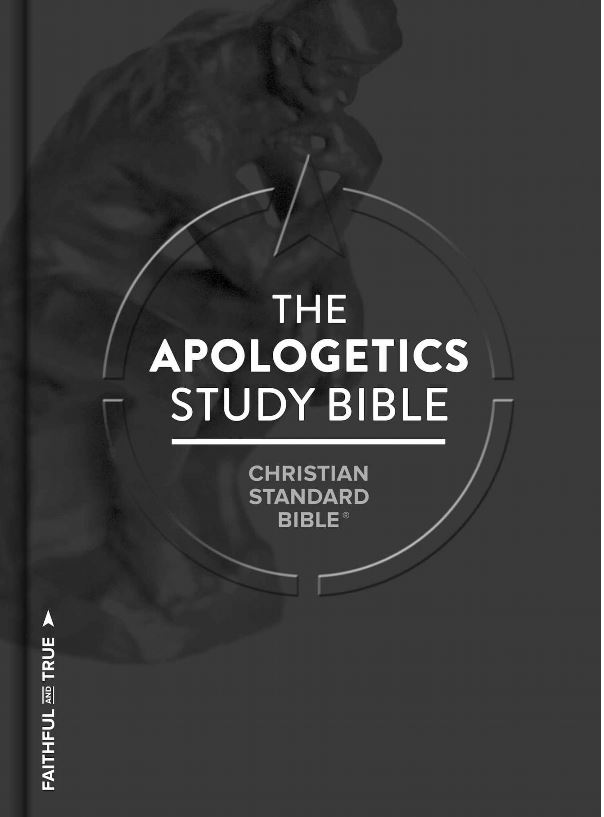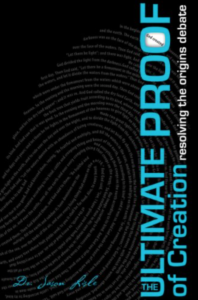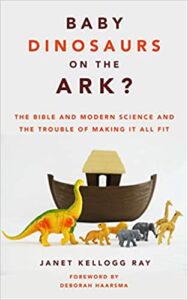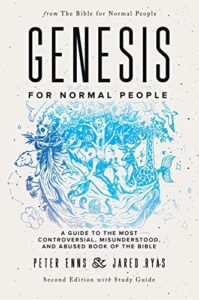The Apologetics Study Bible, as the name would suggest, is a study bible. And also, as the name would suggest, it is aimed at informing its readers how to defend the truth of Christianity from “the intellectual attacks of the heathens” to use C.S Lewis’ words. This Bible is filled with articles written by such famous Christian Apologists as William Lane Craig, Lee Strobel, Ravi Zacharias, Paul Copan, Ron Rhodes, J.P Moreland, Sean McDowell, Tim McGrew, and many others. The very first article was written by Lee Strobel, who, as those who read the introduction to my book The Case For The One True God: A Scientific, Philosophical, and Historical Case For The God Of Christianity know, was the apologist God used to save me from agnosticism back in 2010. In this short article, Lee Strobel briefly tells his story of how God converted him through the historical evidence for Jesus’ resurrection and for the historical reliability of the New Testament, as well as theistic arguments such as The Kalam Cosmological Argument. Strobel read books and articles by both Christians and Atheists for two years and at the end of it, concluded that Christianity is true beyond a reasonable doubt, and said that it would take more faith for him to continue to be an atheist than for him to become a Christian!
William Lane Craig also has some good articles in this study bible such as “What About Those Who Have Never Heard Of Christ” and “Did Jesus Really Rise From The Dead?” In the former, Craig responds to those who think that God unfairly sends millions of people to Hell before they even had a chance to hear the gospel, much less reject it. Craig argues that God has given revelation of His existence in nature and conscience as scripture says in Psalm 19:1-4, Romans 1:20, and Romans 2:14-15. Therefore, people can know both that God exists, that certain things are right and wrong, and that we are sinners in need of forgiveness without ever opening a Bible or hearing a preacher. One can throw themselves upon the mercy of “the unknown God” and say “God, I don’t know who you are or what you want from me. But I know I’ve done wrong. I know I’m not as good as I ought to be. Have mercy on me.” And God will let that person into Heaven. This isn’t to say people are saved outside of the work of Christ, but that they can be saved through the work of Christ, yet without conscious knowledge of Christ. Of course, The Bible in various places (e.g Romans 10:14) gives us reason to believe that not many people will be saved through general revelation alone. So, what do we say about people who, although they reject God’s natural revelation, would have responded to special revelation (the gospel) if they had heard it? Craig suggests that God, being omniscient, knows that if Person X would freely choose to receive Christ if he had a chance to hear the gospel, then God providentially orders the world in such a way so that person X finds himself in a situation where he does hear the gospel and is therefore saved. God wants no one to perish, but for all people to come to repentance (2 Peter 3:9, 1 Timothy 2:4), so Craig says that given God’s goodness and love, and given that God knows how every free creature would freely choose in any given circumstance, then we can be reasonably certain that there are no such people who die unevangelized, rejecting God’s general revelation, but would have been saved if only they had gotten a chance to hear the gospel.
In Craig’s article “Did Jesus Really Rise From The Dead?” He lists several historical facts that are universally agreed upon by historians and New Testament scholars, even the non-Christian scholars; Jesus’ empty tomb, post-mortem appearances to His disciples, Paul, and James, and the radical transformation of the disciples after Jesus’ death. Craig supports each of these facts using the “Criteria Of Authenticity” such as The Criterion Of Multiple Attestation, The Criterion Of Embarrassment, The Criterion Of Enemy Attestation, etc. When historians examine documents that claim to be recording history, they will apply these and other principles to the texts they are examining to see whether what these texts say are true. Craig (and other apologists) treat The New Testament documents in exactly the same way when arguing for Jesus’ empty tomb, post-mortem appearances to His disciples, Paul, and James, and the radical transformation of the disciples after Jesus’ death. Although Craig appeals to The New Testament documents, he doesn’t treat them as inspired scripture to support his claims. Instead, he applies “The criteria of authenticity” to the New Testament to argue that these historical facts are indeed historical and factual. He then goes onto argue that Jesus being miraculously raised from the dead by God is the best explanation for these historical facts. Now, given that Craig had very little space to make his case (this is a short article in a study Bible after all), I would recommend that one look at his books Reasonable Faith and On Guard where he spends entire chapters unpacking what he briefly overviewed on two pages. And also I do the same in my book My Redeemer Lives: Evidence For The Resurrection Of Jesus and in my 10 part blog post series on Jesus’ resurrection.
I also really liked Tim McGrew’s article “Is There Evidence For Undesigned Coincidences Supporting Biblical Truth?” His wife wrote a fantastic book on this subject called Hidden In Plain View that I recommend. Basically, the Undesigned Coincidence Argument argues that the gospels are historical, factual records of what happened during Jesus’ 3-year ministry, His death, and His resurrection because of interlocking questions and answers that each of the gospels raises and answers between themselves. Matthew might report something odd that raises a question, and then in another gospel, you have the answer to that question, sometimes not even in the same context.
For example, Luke 23:1-4 contains some puzzling events. The Jews seize Jesus and carry him off to Pilate; they tell Pilate that Jesus claimed to be a king, which would have been treason in Roman ears. Pilate asks Jesus, “Are you a king?”, and Jesus confirms it. Pilate then declares Jesus innocent. Wait, what? He’s not guilty? Isn’t it treasonous to claim to be a king? What was Pilate thinking? Well, John’s account tells us why did Pilate found no fault with Jesus.
In John 18:36, Jesus says to Pilate: “My kingdom is not of this world. If My kingdom were of this world, My servants would fight, so that I should not be delivered to the Jews; but now My kingdom is not from here.” It is therefore easy to see why Pilate finds no fault: Jesus claims to be king of another world. We can imagine that Pilate might be confused at what that would mean, but Pilate would have seen Jesus as a harmless religious kook who isn’t a threat to Roman rule.
Moreover, in the scene from Luke, we read about the accusation against Jesus, but John does not mention it, leaving the question: why does Pilate ask whether Jesus is a king of the Jews? But Luke supplies the answer: an accusation was made and Pilate was right to inquire about it. Luke explains John, just as John explains Luke. There are many examples like these that build a cumulative case for the eyewitness nature of the gospel accounts. Contrived narratives simply don’t work like this.
Aside from these and other good articles, The Apologetics Study Bible has footnotes that correspond with various biblical passages that skeptics have used as ammunition to discredit The Bible, or that cultists have used to support their heresies, or just raised puzzling questions in the minds of readers. For example, Exodus 4:21 has a corresponding footnote explaining the hardening of Pharoah’s heart. Exodus 4:21 says “The Lord instructed Moses, ‘when you go back to Egypt, make sure you do before Pharaoh all the wonders that I have put within your power. But I will harden his heart so that he won’t let the people go.” The corresponding footnote says;
“The Bible teaches that human beings are free to make choices (Gn 2: 19; 4: 7; Ezk 18: 2-32). God is good (Ps 25: 8; 34: 8; 100: 5) and always acts consistently with his nature. Yet people can choose to rebel against God’s goodness, and consistent rebellion can lead to their hearts being “harden[ ed].” As the saying goes, “The same sun that melts butter also hardens clay.” Egyptian pharaohs believed they were divine, and Pharaoh would never have been inclined to submit to the Israelites’ God. Each time God placed a demand on him, he became more determined to resist. Thus it was both God’s demands and Pharaoh’s own pride-motivated stubbornness (Ex 8: 15,32; 9: 34) that led to his hardened heart. God would use Pharaoh’s stubbornness for a good end, to demonstrate his power and extend his reputation (9:16).”
Overall, I think this is an excellent study Bible and anyone looking to learn how to better learn to defend God’s Word should get this study Bible. It is available in Hardcover and Kindle.
The back of the study Bible has a couple of pages highlighting important archeological finds verifying historical facts in both the Old and New Testaments. For example, on The New Testament page, it lists The Pilate Stone Inscription which was discovered in 1961 in Caesaria Maritima which confirms the existence and office of Pontius Pilate. Of course, Pilate’s existence and office are also corroborating by the writings of Josephus and Tacitus, but this is just another piece of evidence. It also lists The Caiaphas Ossuary which was discovered in 1990 near Jerusalem which confirms the existence of the high priest Caiaphas. Again, Caiaphas was mentioned by extra-biblical writers like Josephus, but we actually have his bones! It also lists The Pool Of Siloam, discovered in 2004 in Jerusalem. This was the site of one of Jesus’ miracles as recorded in John 9:1-11. For a long time, scholars doubted the existence of this pool until its discovery in 2004, proving The Bible right and the skeptics wrong.






When someone writes an piece of writing he/she retains the
thought of a user in his/her brain that how a user can be aware of it.
Therefore that’s why this paragraph is outstdanding. Thanks!
Howdy just wanted to give you a quick heads up. The text in your post seem to be running off the screen in Firefox.
I’m not sure if this is a format issue or something to do with web browser compatibility
but I thought I’d post to let you know. The design look great though!
Hope you get the problem solved soon. Thanks Hey there just wanted to give you a quick
heads up. The words in your content seem to be running
off the screen in Chrome. I’m not sure if this is
a format issue or something to do with browser compatibility but I thought I’d post to let you
know. The design look great though! Hope you get
the issue solved soon. Cheers Ahaa, its pleasant dialogue concerning this post
at this place at this web site, I have read all that, so at this time me
also commenting at this place. http://cspan.org
Thanks for telling me. It looks fine on my Silk browser on my Amazon Fire tablet, but I haven’t been here on Chrome or FireFox. You are on mobile device yes? Because I see Google Chrome on my computer and it looks perfectly fine on the computer version of Google Chrome. I haven’t been to my website on my phone yet. I only just recently moved from Blogspot. Thanks for alerting me. I’ll get on my phone later and see if it looks winky on there or not.
Thanks for finally writing about >Review Of The Apologetics Study Bible
(2017 edition) – Cerebral Faith <Loved it!
Hi, Neat post. There’s a problem with your site in internet explorer,
would test this? IE nonetheless is the market leader and a large component to other people will omit your magnificent writing due to this
problem.
Most people I know about hate Internet Explorer because its a lot slower than other browsers. Most prefer Google Chrome, FireFox, or Opera. Nevertheless, I do want the site to work well on all browsers and all devices. I checked several pages on my own version of Internet Explorer on my PC and nothing seems unusual. Perhaps whatever post you viewed had bad formatting. I did recently move from Blogspot and some posts didn’t transfer well. In fact, MOST didn’t. I spent days fixing the formatting issues, and of course fixing links whenever one blog post I wrote referenced and linked to another blog post that I wrote. It could be that there’s nothing wrong with the site, just that particular article?
I always spent my half an hour to read this blog’s
posts daily along with a cup of coffee.
That’s great to hear, Camera! God bless you! 🙂
Woah! I’m really digging the template/theme of this website.
It’s simple, yet effective. A lot of times it’s tough to
get that “perfect balance” between superb usability and appearance.
I must say you have done a very good job with this.
In addition, the blog loads very quick for me on Internet explorer.
Outstanding Blog!
?
I’m new to apologetics, what books would you recommend?
Emily, while I don’t want to shamelessly self-promote, I think you’d benefit from my book “The Case For The One True God: A Scientific, Philosophical, and Historical Case For The God Of Christianity”. Aside from my own book, I’d recommend William Lane Craig’s “On Guard: Defending Your Faith With Reason and Precision” and Lee Strobel’s “Case For” series, such as “The Case For Christ”, “The Case For The Real Jesus”, and “The Case For Faith”.
I think this is among the most important
info for me. And i’m glad reading your article.
But wanna remark on some general things, The
site style is ideal, the articles is really excellent : D.
Good job, cheers
Heya just wanted to give you a quick heads up and let you know a few
of the images aren’t loading correctly. I’m not sure why but I think its a
linking issue. I’ve tried it in two different web browsers and both show the
same outcome. https://www.purevisionmethod.com/astigmatism-test/
Which ones? On what page?
Hello there! Do you use Twitter? I’d like to follow you if that would be ok.
I’m definitely enjoying your blog and look forward to new updates.
Yes, just type in @CerebralFaith in Twitter’s search bar.